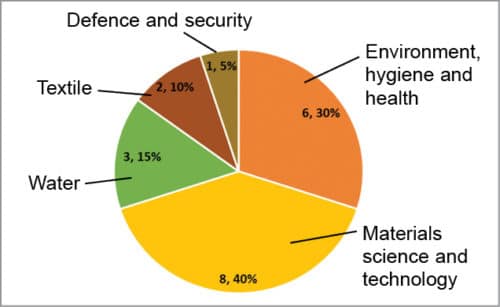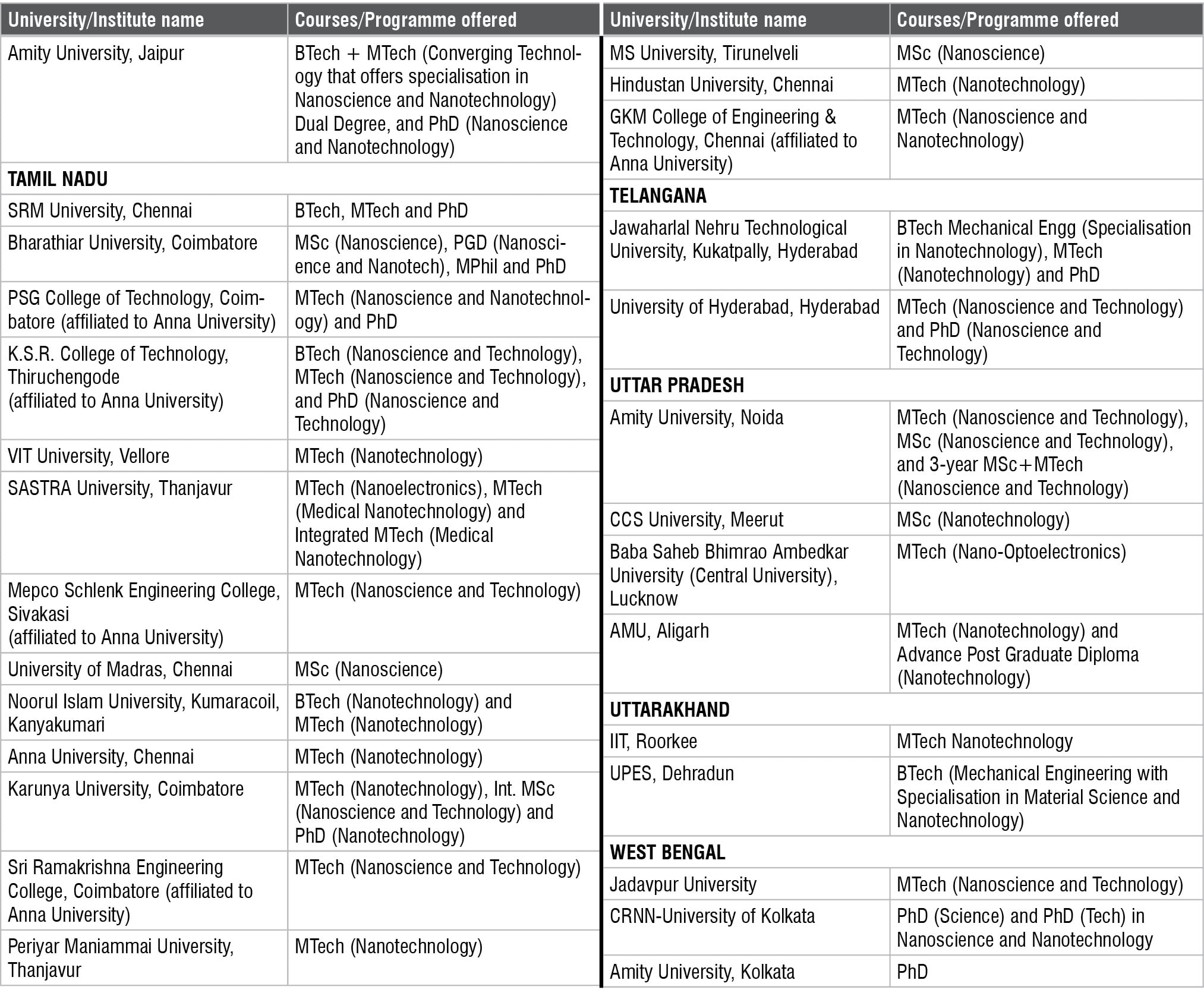This article discusses the scope of nanoscience and nanotechnology along with curricular courses, initiated by various Indian institution.
Advancements in science and technology have led to the emergence of nanoscience in India. This has further led to the development of various specialised courses for nanoscience and nanotechnology. Universities and institutions in India have started bachelor’s, master’s and research programmes in nanoscience and, subsequently, nanotechnology as an extended branch of basic sciences in India. Most nanoscience courses in India have emerged out of Physics, Chemistry, Life Science and other engineering departments of various institutions.

Introduction of nanoscience and nanotechnology started as an elective course. Then, with permission from apex bodies, institutions started full-fledged courses (mostly two-year ones). A few institutions have also started research programmes in interdisciplinary areas of nanoscience and nanotechnology. In some universities, these have come out as independent departments or centres, while in others as part of core departments.
Infrastructure facilities were not good 10 years ago, but now in many institutions, these are self-sufficient to run nanoscience and nanotechnology programmes. Teachers have been inducted from various basic science and engineering departments to contribute in their areas of expertise. In a few institutions, permanent teaching faculties have been hired to run the programmes under schemes such as special or innovation centres, or centres of excellence (CoEs).
Agencies such as CSIR, DST, DBT, ICMT, DRDO, ISRO, DAE and other national labs help post-graduate (PG) students with their final thesis or research projects through their established infrastructures. Certain institutions have started the nanoscience and nanotechnology programmes in collaboration with international universities. Students spend one or two semesters abroad as a part of the mandate of these collaborations.
PhD programmes are also running via such collaborations, in addition to independent guidance courses in universities and institutions.
The government of India has taken the following initiatives to support nanoscience and nanotechnology activities:
- Initiatives such as DST-Nanomission (nano-biotechnology activities) through DBT, ICMR and CoE in Nanoelectronics by MeitY support nanoscience, nanotechnology, nanobiotechnology and nanoelectronics activities.
- Eighteen sophisticated analytical instruments facilities (SAIFs) established by DST across India play a major role in advanced characterisation and synthesis of nano-materials for various applications.
- CoE in Nanoscience and Nanotechnology established by DST-Nanomission helps research and PG students in various thrust areas.
- Thematic units of excellence (TUEs) for various areas of nanoscience and nanotechnology play a major role in product-based research to support nanotechnology.
- Visveswaraya PhD fellowships offered by MeitY supports various nanotechnology activities in the country.
- INSPIRE scheme supports research fellows to work in interdisciplinary nanotechnology, nanoscience and nano-biotechnology areas.
- DST-Nanomission supports more than 20 PG teaching programmes to create a baseline for nanoscience and nanotechnology in India, out of about 70 PG programmes currently running in India.
Nanotechnology courses and academic programmes
Out of nearly 70 nanotechnology courses in India, South India occupies around 50 per cent of the institutions. Hence, southern India contributes the highest to capacity-building in nanoscience and nanotechnology.
Seventeen programmes have been funded by the government of India, including 10 from south India.
National Nanotechnology Initiative through Nanomission has impacted the following industries to tie up with academia and R&D labs to develop products and processes:
- NFMTC – IITM and MCRC and Orchid Pharma
- Nanotech Centre – UoH and Dr Reddy’s Lab
- Centre Innovative Smart Textile- IITD, ARCI and Industries
- Centre for Pharmaceutical Nanotech – NIPER and Pharma Industries
- Rubber Nanotechnology – MGU and Apollo Tyres
- Nanophosphor Application Centre, UoA – Nanotech Corp, USA

Many industries have shown interest in the area of nanotechnology in the last decade, including Tata, Mahindra & Mahindra, Piramal, Intel, Orchid Pharma, Apollo, Dr Reddy’s, Resil, Cranes, Panacea, Vecco, BEL, Moser Baer, Insta Power, SBP Aqua Tech and Eureka Forbes.
The nanotechnology programme in India has been successful through the following initiatives:
DST-Nanomission
DST sponsored 11 units of nanoscience, seven centres and one computational facility. Public-private partnerships and three private institutions played major roles along with 30 central, autonomous, state and deemed universities. Outcomes of the nanoscience and nanotechnology programme is shown in Fig. 1.

Impacting, Research, Innovation & Technology (IMPRINT)
Through IMPRINT-I initiative by the government of India (MHRD in association with other ministries), stress has been given to upgrading nano-education and various modules. Two projects have been initiated on nano-education, and 21 projects on nanotechnology and related hardware.
DRDO
It has also focussed on various nanotechnology activities through its establishments like SSPL, DMSRDE, DLJ, NMRL, DMRL, NPOL, HEMRL and DIHAR. DRDO also started CoEs in following areas:
- Nanotechnology-based sensors for NBC nuclear, biological, chemical (NBC) detection
- Nano optoelectronic devices
- ARCHEM-University of Hyderabad


DBT
This is a nano-biotechnology initiative aimed at the intervention of nanotechnology for:
- Early translational science through innovation for future application strategies
- Translational research for proof of concept leading to product development
- Innovative tools and technology for pre-clinical research in priority areas
ICMR
ICMR has formed a task force on nanomedicines, and funded various activities on nanotechnology and nanomedicine.
MeitY
Meity has funded more than 45 projects in various areas of nano-electronics, such as LEDs, OLEDs, organic electronics, flexible electronics, carbon materials, pulsed laser techniques, nano-fabrication, silicon-based materials, III-V and II-IV materials, plasma-based CVD, sensors, band-gap materials, simulation, spintronics, data storage, MEMS, NEMS, nano-crystalline materials, devices and advanced nano-materials for sensing, health, detection, agriculture and neuroscience. The best and most productive initiative was CoE in Nanoelectronics (CEN) at IISc and IIT Bombay, and Indian Nanotechnology Users Programme (INUP phases I and II). Outcomes have been extremely promising with nearly 72 patents and more than 1000 papers.
Nanotechnology intervention in the field of agriculture has already started in India through various R & D projects, including:
- Crop protection
- Fertilizers
- Soil quality improvement
- Water purification and pollutant control
- Sensors for environmental monitoring
- Breeding
- Nanomaterial production from agricultural resources

Apart from the above stated, established companies and various startups have also entered the market of nanotechnology in various domain areas of nanoscience and nanotechnology. Some such companies are:
- Adnano Technologies: Carbon nanomaterials and advanced characterisation instruments
- Advanced NanoTech Lab: Coating products
- Auto Fibre Craft (AFC) Powders: Specialised silver nanomaterials
- AVANSA Technology & Services: Carbon-based nanomaterials and instruments
- Bee Chems: Nano-silica products
- Bilcare: Unique security technology called nonClonable using composites to provide a fool-proof security system
- Bottom Up Technology Corp.: Carbon nanotubes
- Dabur Pharma: Drug delivery
- Egoma Technologies: Nanopowders
- Eris Technologies: Nano-education and certification
- Icon: Analytical instruments, with a focus on nanotechnology and related analytical techniques
- Kerala Minerals & Metals (KMML): Titanium dioxide nanoparticles
- Micromaterials (P) Ltd: Nano and micro technologies and materials catalysts; new-generation catalysts are the result of a radically new patented process
- Mittal Enterprises: Nanofluid
- Nano Cutting Edge Technology NanoCET: Bio-stabilised nanoparticles
- Nanomics Technologies: Nanopowder, nanomaterials and suspensions
- NanoResearch Elements: Nanomaterials
- Nanoshel: Nanotubes and nanomaterials
- NanoSniff Technologies: Commercial spin-off from CEN at IIT Bombay; formed to productise technologies developed as part of research work conducted at CEN. This is the first Indian company to successfully commercialise microcantilever and microheater sensor technologies
- Nanospan: Graphene and instruments
- NanoXpert Technologies: Nanoparticles
- Navran Advanced Nanoproducts Development: Polymerised toners
- Neo-Ecosystems: Metal nanopowders
- Nilima Nanotechnologies: Nanocoatings
- NoPo Nanotechnologies: Carbon nanomaterials
- Platonic Nanotech: High-quality graphene
- Quantum Corporation: Nanomaterials and nanocomposites as core materials for telecommunications, electronics, drug delivery, conductive films, lighting and energy industries, without the need to change existing processes
- Reinste Nano Ventures: Nanomaterials
- Saint-Gobain Glass: High-quality nano-coatings
- Sisco Research Laboratories (SRL): Chemicals and nanomaterials
- Smart Nanoz: Nanoparticles
- Ultrananotech: Nanoparticles and graphene
- Vecco: Analytical instruments
Future roadmap
The scientific community, policy makers, apex bodies and funding agencies are continuously striving to progress in various areas of nanoscience and nanotechnology, in the fields of water, clean energy, defence, health, medicine, infrastructure, communications and more areas of topical interest. In the last two decades, India has achieved many milestones in the areas of nanoelectronics, nanomaterials and nano-biotechnology, and many are yet to be achieved. It has created many scientists of international repute in the areas of nanoscience and technology, while many young minds are still being formed.
Initiatives like Digital India, Make in India, Startup India, Skill India and other innovative and ambitious programmes like Nanomission, INUP – I and II, and IMPRINT – I and II have given a great thrust to Indian nanotechnology programmes.
Subhranshu Sekhar Samal is co-ordinator (PMU), International Advanced Research Centre for Powder Metallurgy & New Materials (ARCI) and co-founder, Evergreen Association
Amrita Samal is co-founder, Evergreen Association










Very Informative article. Young students interested in the area of nano-science and nano-technology will find it to be very helpful .
Thank you for your valuable feedback.